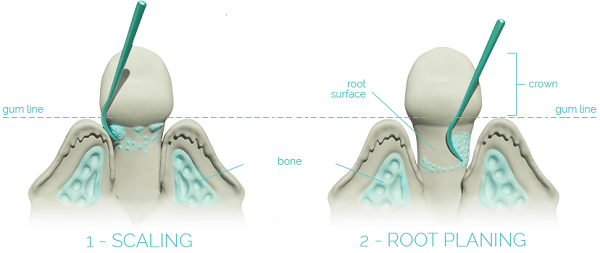WHAT IS SCALING?
Dental scaling is routinely done to treat patients with gum disease and excessive plaque buildup. While a standard cleaning will approach the surface of the tooth, scaling goes much deeper. If your dentist suggests dental scaling and root planning for your teeth, it’s helpful to know what this means so you can prepare for what’s ahead.

UNDERSTANDING SCALING:
Scaling is a simple and popular dental procedure for patients with gum disease. This is a kind of dental cleaning that reaches below the gum line to remove plaque buildup. The process of scaling and root planning the teeth is often referred to as deep cleaning. This procedure goes beyond the general cleaning that you receive with your regular checkup and annual visit.
WHEN IS DENTAL SCALING NECESSARY?
Everyone undergoes some sort of plaque buildup. The saliva, bacteria, and proteins in your mouth create a thin coating that covers your teeth at almost all times. When you eat, tiny particles, acids, and sugars from the food stick to this film, creating an accumulation on the teeth known as plaque. The bacteria that exist in this plaque can cause gum disease and tooth decay.
If you have healthy gums, the tissue will fit firmly around the tooth and keep plaque out. However, if gum disease starts to develop, this tissue will be slackened.
Healthy gums mean it should attach the tooth 1 to 3 millimeters below the gumline. With gum disease, you’ll begin to generate deeper pockets. These can invite more plaque and bacteria, worsening your problems and causing symptoms like bad breath.
If you have gum pocket more than 4 millimeters, your dentist will probably recommend dental scaling to remove the plaque from the pockets and help to treat the gum disease.
Scaling and Root Planning Procedures:
Dental scaling involves the thorough removal of plaque bacteria from the tooth’s surface just below the gumline. There are two basic techniques for scaling teeth. If your dentist uses handheld instruments, he or she will remove plaque from the tooth using a metal tool known as a dental scaler and curette.
The dentist will embed this thin tool under the gum line to access plaque your toothbrush can’t reach.

Alternately, your dentist may take an ultrasonic instrument to scale your teeth. This device contains a vibrating metal tip combined with a cool water spray. The tip chips tartar away as the water flushes out the pocket.
Dental scaling is typically accompanied by a procedure known as root planing. Root planing reaches the tooth root. This is done in the same way as scaling. The aim of the Root planing is to smoothen the surface of the root so the gums can reattach properly.
WHAT DOES SCALING FEEL LIKE?
Dental scaling can be a little uncomfortable, especially if you have sensitive gums. Your dentist may apply a local anesthetic to numb the gum tissue and make the procedure more comfortable. Speak with your dentist about your options for desensitizing the area if you’re worried about pain or discomfort during the process.
Dental scaling can take more than one visits, each visit will address a different portion of the mouth. If you’re worried about the process, ask your dentist if he can schedule your scaling for a single visit. Though this isn’t an option for all cases, it may be available if you have only moderate gum disease and are willing to sit for a lengthy procedure.
WHAT TO EXPECT AFTERWARDS
You may experience soreness and sensitivity after the dental scaling and root planning.
Rarely some patients experience swelling or bleeding for a few days following the procedure. Your dentist will desensitize toothpaste to ease this discomfort.
You might get a prescription mouthwash to use after the procedure, as well, to help keep the gums clean. It’s essential that you follow regular brushing and flossing procedures after your scaling to stop plaque from forming again in the same areas.
Ask your dentist about the next visit after your dental scaling to examine the gums, measure the depth of your gum pockets, and make sure your mouth is healing properly. If the gum pockets have gotten more profound since your scaling, you may need to explore additional treatment options to help you maintain a healthy smile.
Dental scaling is a very common treatment for patients with gum infection. Nearly half of Indian adults have gum disease, so you’re not alone if your dentist recommends this procedure.
DR. JENA SHAH DENTAL DIRECTOR AT SABKA DENTIST SAYS “SCHEDULING DENTAL SCALING CAN HELP YOU BATTLE HIDDEN PLAQUE AND MAINTAIN A HEALTHIER MOUTH. IF YOUR DENTIST SHOWS THAT YOU NEED DEEP CLEANING, DON’T HESITATE TO SCHEDULE THIS APPOINTMENT. THE RESULT IS A FRESHER SMILE THAT YOU’RE SURE TO ENJOY”.





